Tuning into the value of music in school
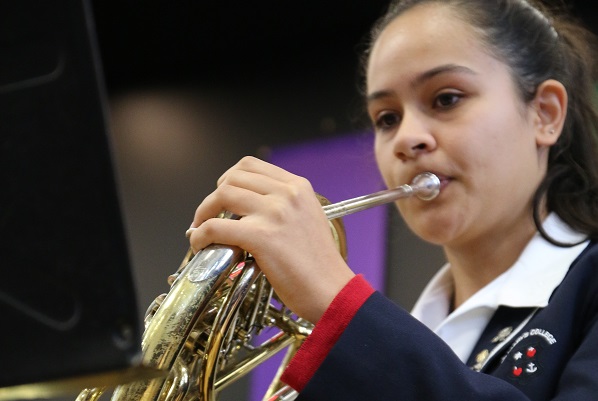
As you walk into St Mary’s College on a Thursday morning, you can hear music wafting across the historic grounds.
This is the sound of a school where music holds great importance; for three hours each week, other lessons are set aside and students gather in choirs and ensembles to practice, and to uphold the school’s long tradition of musical excellence.
At St Mary’s, a Catholic college for girls in central Auckland, it is believed that learning music enriches the mind. Every student in years seven to nine takes weekly music lessons and participates in an ensemble. They follow a tradition of music at the school which counts acclaimed opera singers amongst its graduates, most notably Kiri Te Kanawa, Malvina Major and Isabella Moore. The school employs an astonishing 17 music teachers, and most students – 650 of the total 1,000 – participate in St Mary’s orchestras, bands, choirs and chamber groups.
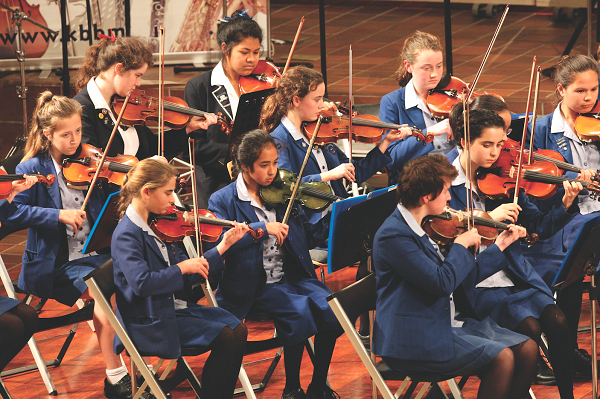
There is much scientific evidence to show that learning an instrument aids academic learning, and certainly the school’s academic record bears out this research, with NCEA results consistently amongst the top in New Zealand. The school’s head of instrumental music, Rachel Snelling, says there are many other benefits too. “Personally I think it’s a combination of reading music and playing an instrument that supports brain stimulation, and playing in an ensemble helps students to develop skills of concentration and cooperation. These cooperative skills developed within the music groups assist in providing a feeling of belonging and support the sense of community within the school, as well as a love of music that we hope stays with them forever”.
The social benefits are huge, too, with young musicians developing the practice of discipline, patience, team skills, as well as a sense of responsibility both for their instruments and for their ensemble. For evidence, look no further than El Sistema, a programme in 55 countries which seeks to effect social change through the pursuit of musical excellence. El Sistema reached New Zealand six years ago, starting in a cluster of decile one schools in South Auckland, and a recent evaluation revealed that students engaged in Sistema Aotearoa had “a significantly higher educational achievement in both reading and mathematics” than those who were not in the programme.
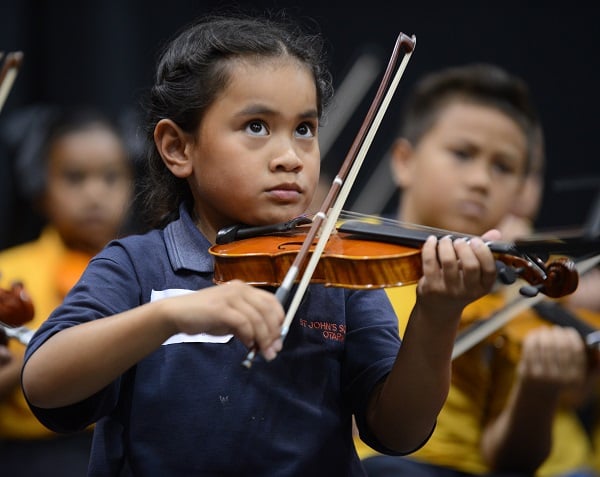
“Feedback from the seven Otara schools involved demonstrates that participation in Sistema enriches students’ involvement in the school curriculum and reinforces positive school culture and participation has improved attendance and behaviour at school,” says Robyn Trinick, senior music lecturer at Auckland University. “Teachers report Sistema Aotearoa students show more perseverance, i.e. sticking to a task even if they can’t immediately do it, and increased self-discipline, that is, children are able to self-manage their jobs and responsibilities and be organised. Children show improved achievements in literacy, numeracy and other curriculum objectives including key competencies: thinking, language use, self-management, relating to others, participating and contributing.”
Furthermore, the students’ families were shown to have greater involvement with their child’s school and to be more ‘enabled’ in approaching the school. “Families demonstrate cohesiveness and work together to support their child/ren to succeed in Sistema Aotearoa. The programme was found to reinforce family values and raise aspirations in the families of participating students.”
The South Auckland programme is the largest of its kind in New Zealand, impacting more than 1,000 children each year, and new Sistema clusters have sprouted in Whangarei, Waikato and Hutt Valley. Professionally trained musicians work with students in their local communities, at no charge to participants. Lessons are at least twice weekly, in groups, with older children taking responsibility for helping the younger ones.
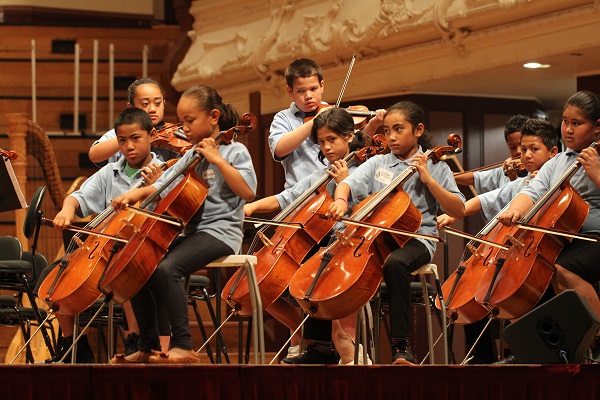
El Sistema was started in 1975 by Venezuelan educator, Jose Abreu, who said, “Music has to be recognised as an agent of social development, in the highest sense because it transmits the highest values – solidarity, harmony, mutual compassion. It has the ability to unite an entire community, and to express sublime feelings.”
Internationally, the programme has been credited with changing the life trajectory of hundreds of thousands of disadvantaged children. Renowned conductor Gustavo Dudamel, born into poverty, had his musical beginnings in El Sistema and said that it saved his life. “Like food, like health care, like education, music has to be a right for every citizen.”
Another charitable venture starts next term in the Hutt Valley, where high school students donate time and musical expertise to children from low decile schools. This programme is the brainchild of Jonny Wilson of the Goodtime Music Academy, with support from local charities and Hutt City Council.
Mr Wilson says he hopes that the programme will deliver the hope and support he received during his own musical training at school. “When I was at high school I failed almost everything, but I had a drum teacher who was the most amazing mentor to me. I became a great musician, and that turned my life around. I gained confidence – and I wanted to do for other kids what my mentor had done for me.”
Since school, Mr Wilson has gained a music degree, set up his music school and is now pursuing a master’s degree in theology. He also developed Rad Rhythm, a low cost digital tool designed specifically for teachers to use in classrooms, in response to requests from local schools.
Broadly speaking, the Ministry of Education (MoE) supports schools to provide students with a musical education. “The emphasis is very much on making music come alive for young people, and sparking their enthusiasm and passion for music,” says Karl Le Quesne for the MoE. “The curriculum isn’t prescriptive so teachers have a great deal of freedom on what they teach and how they teach. The critical point is young people have the opportunity to learn about music and to make music and we are committed to continuing to support schools to encourage participation in all kinds of music.”
In real terms, this means that the money has to come from the school operations grant, along with almost all other costs involved in running a school.
At St Mary’s, the board of trustees supplements student contributions ($75 per year for tuition and ensemble), added to which students can hire instruments from a trust aligned to the school. Schools which do not have this option may wish to explore other avenues such as these MoE-supported grants and programmes:
Learning Experiences Outside the Classroom (LEOTC) comprises a contestable funding pool that supports community-based organisations to provide students with learning experiences that complement and enhance student learning, in alignment with the national curriculum.
Teachers’ Refresher Course Committee (TRCC) runs a variety of music courses to support teachers.
Out-of-hours Music and Arts provides additional professional tuition not normally available within the staffing ratio allocations of primary schools.
The New Zealand Music Commission (NZMC) programme provides face-to-face mentoring sessions with renowned musicians for students in years seven to 13. They share their music, recording and composition skills, as well as their knowledge of the music industry and of performance experience.
Secondary Vacation Music Grant supports recognised national music education events and courses to provide secondary school students with opportunities to participate at a national level.
Stage Challenge and J Rock is a high-energy dance, drama and music extravaganza that aims to motivate and inspire students to lead positive pro-active lives by giving them a ‘natural high’ without the use of drugs, tobacco or alcohol.
The National Secondary Schools Kapa Haka Competition supports development of Māori language skills, provides leadership opportunities and promotes tikanga Māori, history and more.
Sistema Aotearoa This programme provides group tuition in a community setting within a school environment.
Pūoro is an integral part of learning in Māori medium kura and wharekura. Some kura and wharekura provide integrated and comprehensive musical education, with music as both a dedicated learning area and an essential part of life within the kura.

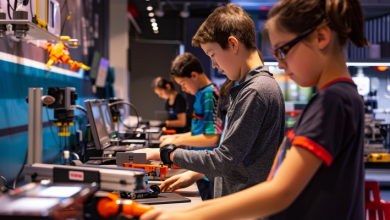
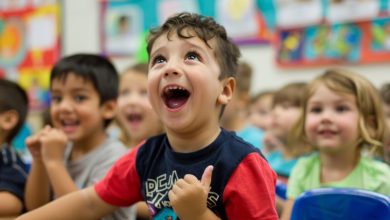
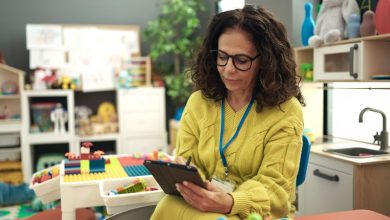
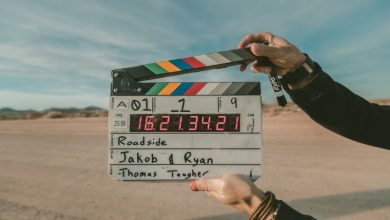


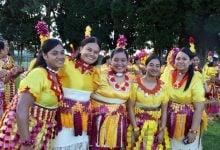

Dear Anna,
I read your article on the value of music in schools with interest, but was puzzled that you didn’t seem to have come across the Porirua Sistema music scheme (run by the Virtuoso Strings Charitable Trust) which delivers free music programmes to hundreds of East Porirua youth, and is undoubtedly one of the largest Sistema-inspired scheme in the country. Our wonderful East Porirua musicians are a role model for other aspiring musicians.
Cheers,
Liz